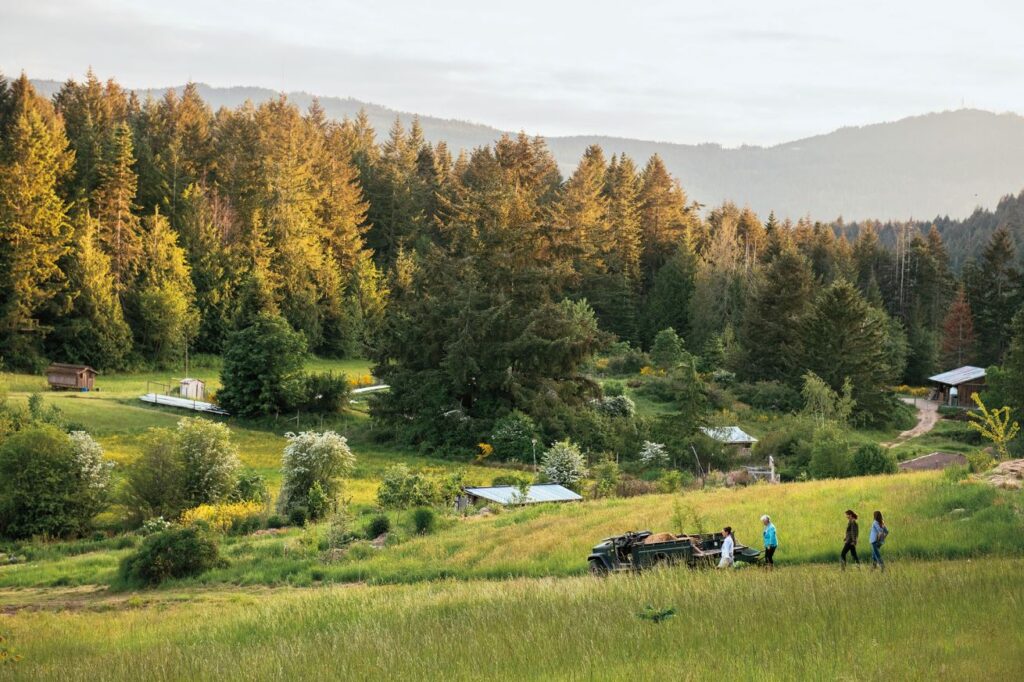Advertisement
This Is What Modern Farming Can Look Like
The visionary women behind Salt Spring Island’s Stowel Lake Farm

“One day, I’m going to live on a farm,” Lisa Lloyd promised herself. So she packed up her three children and set out to make that dream a reality. Today, this little idea has sprouted into something so much bigger.
It’s easy to miss the front gate, tucked away on a quiet country lane on Salt Spring Island, BC. Beyond it, Stowel Lake Farm’s 115 lush acres unfold before you. Forget what you think you know about farms. A new vision for community and quiet sustainability has taken root here.
A little girl’s dream
Ever since she was young, Lisa Lloyd loved being connected to nature and the earth. When she saw the land for sale, Lloyd knew this was her chance.
And so she packed up her three young children and made the move. Sheep freely roamed the island back in the 1970s, so getting a flock of her own was a natural starting point. Through trial and error, gritty determination, and long days and nights, fences went up. Lambs were birthed. Soil was tilled. Seeds were sowed. And life for this little family began to sprout and flourish.
Seasons came. Seasons went. Horses replaced her sheep. Gleaming bottles of milk from her first cow began to appear in fridges across Salt Spring. Summers were spent harvesting endless baskets of strawberries.
As Lloyd’s children grew, so did the community around the farm. She’d always wanted to feel part of a deeply interwoven community, and the sprawling farm became a hub for exactly that.
Rollicking dances and musical performances filled the barn. Lloyd began hosting meditation gatherings on her front porch, which then led to weekend retreats as people sought out the farm’s idyllic peacefulness. Friends and travellers came and went, staying in spare bedrooms or the farm’s cozy Volkswagen bus.
One by one, Lloyd’s children grew up and moved away. She missed having them around, but all things come to those who wait. So Lloyd waited. More seasons came and went, and then a new season began.
A return to love
“I never really saw this in my future,” laughs Lloyd’s daughter, Jennifer Lloyd-Karr, who now calls the farm home (again) alongside her husband and two children.
When Lloyd-Karr graduated from university, her childhood farm was simply a place to rest and work between travelling. “I lived summer to summer for many years,” she says. “Whether or not I came back to the farm depended on who would be there.”
A friend, Elizabeth “Liz” Young, joined her one summer. The two were inseparable, and you could hear their music and laughter echoing through the fields and gardens. And so the two kept coming back, year after year. Lloyd-Karr began to ponder what life would be like to stay there full time.
“There wasn’t a specific day where I was like, ‘I’m going to become a farmer!’” she explains. “It was a flow.”
Her now-husband was living in California, and as their relationship grew more serious, the question of where they’d live came up repeatedly.
Lloyd-Karr gazes across the farm, from the farm stand overflowing with produce—passersby can help themselves under the honour system (a Salt Spring tradition)—to the tidy rows of organic vegetables. She’s confident that her choice all those years ago was the perfect one.
“The farm and the community were developing in a direction that was interesting, and we wanted to be a part of it,” she reminisces. “The people who wanted to stay here were interesting to us, and we wanted to build a life in conjunction with them. So we said, let’s escape the North American rat race and let’s try this!”
They weren’t the last ones to make the leap.
Ahead of her time
Lloyd’s goal of an organic, sustainable farm back in the 1970s was decades ahead of the trend. Some of BC’s earliest farm-to-table and locavore restaurants didn’t open until the mid-1980s. And it was only in the 2000s that the idea of sustainable, local food truly exploded in popularity.
Who needs a grocery store?
If you’re craving what Lloyd-Karr refers to as “zero-mile food,” the farm stand is a must-see. Browse harvested-just-minutes-ago veggies, as well as baked goods, flower bouquets, and more. It’s so popular, they have to restock the stand multiple times a day.
Community Grows
After so many summers working together, Lloyd-Karr’s friend Liz Young also couldn’t resist the draw of the farm.
Five years later, along came culinary guru Haidee Hart.
Lloyd-Karr, Young, Hart, and their husbands and children make up the farm’s three core families. Dozens of people live here, but it’s these three families—along with the matriarch who started it all—who lead and steward the farm.
Lloyd-Karr and Young co-manage the business and community. And Hart takes the daily harvest to create inspired meals for the community and the farm’s retreats.
“It evolved organically,” explains Lloyd-Karr. “We never had a master plan to make a women-led retreat centre with my mom. There were big question marks; but we took the risk to live not only in community, but to do something different as a farm and retreat centre.”
Cultivating balance
At the farm, every little thing is interconnected, from the flowers left for the bees, to the compost mixed into the soil, to the fair wages offered to the workers.
And just like their sustainable farming practices, the farm’s women also seek holistic balance and connection in their own lives. This includes the growing number of children on the farm. “I hope my children get to have a sense of place,” says Lloyd-Karr, “that they know where they come from and what the land feels like where they come from. I hope they’re in touch with the fauna, the seasons, and living close to nature.”
In the end, the families are the farm and the farm is the families, with a conscious focus to be a community where all their needs as individuals, as families, and as a society are more integrated.
“What we strive for on the farm is to live all of it here,” says Lloyd-Karr. “We live our work. We live our relaxation. We live our families and marriages. We don’t go ‘there’ for this or ‘here’ for that. It’s all here.
“So much of society is out of balance with finding a way to live well, and with abundance, while balancing work, family, and all of it,” she explains. “We strive to find that here on the farm. We live, work, and play together. We spend time dealing with hard emotional topics together. For us, balance isn’t just one specific thing. This farm is all a big human experiment.”
The future is female
These women are part of a growing minority. While only a third of Canadian farmers are women, nearly 60 percent of new farmers are women.
Thanks, mom
“We were all having babies as we were developing the farm,” laughs Lloyd-Karr. That might be one of the (many) secrets to their success. “It slowed things down. There’s only so much growth in the business when it’s run by mothers with toddlers. Many of our ways of being nourishing and being with each other came out of those early years, setting a good foundation for us all.”
A bustling oasis
On any given day, children arrive for field trips and musicians jam out around a crackling fire. But beyond more informal gatherings, the farm also hosts unique gatherings, events, and services. More than 18,000 visitors have passed through the farm
- weddings
- yoga classes on most weekdays
- wellness retreats, such as silent retreats and meditation retreats
- farm stand with baked goods, seeds, plants, fresh produce, and more
- dancing, painting, and other creative workshops
- corporate retreats
- farm apprenticeships
Joshua Duvauchelle is a regular alive contributor. joshduv.com





